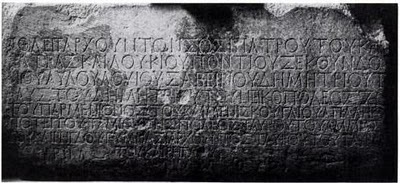On Message, Mobs, and Money from Acts 17
In lieu of a sermon text version or audio message from last Sunday at Plymouth Church, I offer this devotional to keep up with our study on Acts of the Holy Spirit and the Apostles. (I was out of town and we had a guest preacher.)
On Message, Mobs, and Money
In the musical The Sound of Music, Fraulien Maria quotes the Reverend Mother as saying, “When the Lord closes a door, somewhere He opens a window.” I don’t know how biblical that is, but God does send us along by way of closed doors to ones that are open. Such is the case with the Apostle Paul. Having come out of prison in Philippi, he and Silas said goodbye to their new friends and fled for their lives. A door of ministry had closed there but another would open for them a little way down the road that we know as the historic Egnatian Way, if you call 100 miles “a little way”.
Acts 17:1 When they had passed through Amphipolis and Apollonia, they came to Thessalonica, where there was a Jewish synagogue. 2 As his custom was, Paul went into the synagogue, and on three Sabbath days he reasoned with them from the Scriptures, 3 explaining and proving that the Christ had to suffer and rise from the dead. “This Jesus I am proclaiming to you is the Christ,” he said. 4 Some of the Jews were persuaded and joined Paul and Silas, as did a large number of God-fearing Greeks and not a few prominent women.
Paul and Silas passed the 1st century Welcome to Thessalonica sign and they did what they always do: they went to the synagogue.
Isn’t that what you always do when you’re new in town?
When you go on a vacation, isn’t your first stop a place of worship to tell everyone there about Jesus?
Well, it was for Paul and Silas.
Or more than a one-stop, our passage for today says that they spent 3 Sabbaths reasoning with people. That’d be two full weeks of doing evangelism and apologetics and showing people where in the Bible it tells us who Jesus is. The two letters to the Thessalonians in our Bible suggest that Paul stayed there longer than a few Sabbaths, but his welcome at the synagogue probably didn’t go on much beyond 3 weeks. Paul and Silas took their message to the streets. We could learn something from the early disciples about how to witness.
 God-fearers among the Jews and the Gentiles would have had some knowledge of the Scriptures. But there’s nothing like seeing that something has always been there in familiar pages to be convincing. It’s like one of those MC Escher paintings when you see what’s in the drawing. The light bulb blinks on and you can see what had been there all along.
God-fearers among the Jews and the Gentiles would have had some knowledge of the Scriptures. But there’s nothing like seeing that something has always been there in familiar pages to be convincing. It’s like one of those MC Escher paintings when you see what’s in the drawing. The light bulb blinks on and you can see what had been there all along.
So a large number of Jews and God-fearing Greeks believed and “not a few prominent women” who were often the benefactors of itinerant preachers. These women of means paid for lodging and food and other ministry necessities and were women who deserved notice whether being from the foremost families or due entirely to their own merit. So all these people saw what was in the Bible all along. And they believed.
When you’ve got the message right, it’s easy to be persuasive. And Paul and Silas were.
You may remember way back when we had a cycle we talked about: Pure Church, Powerful Church, Growing Church, & Persecuted Church. It’s happening all over again only sometimes faster because their reputation precedes them. It doesn’t take long for word to get around about Paul and Silas. To some, they are persuasive and powerful teachers. To others, Trouble with a capital T that rhymes with P and stands for Paul.
So their good message gets countered with a violent message.
5 But the Jews were jealous; so they rounded up some bad characters from the marketplace, formed a mob and started a riot in the city. They rushed to Jason’s house in search of Paul and Silas in order to bring them out to the crowd.
Mobs form and violence erupts. Might I point out that things are not so different today?
In our world, there are forces devoted to organized disruption, rent-a-mob activities, community organizing for the purpose of fomenting chaos, and wide-ranging opposition. These forces will oppose godliness, truth, and order. It is most clearly seen wherever Truth—especially God’s Truth in the Gospel—is on the line. Wherever a work of God has begun or can shine. The Jews of Thessalonica didn’t like Paul and Silas horning in on their territory with the message of salvation in Christ, so they went to extreme lengths to silence Paul and Silas.
Just as some in our culture will use the power of authorities to get their way and try to silence the work of God, in Thessalonica, the authorities sought to intimidate–not just our evangelists, but even the friends of Paul and Silas—by targeting them. Divide and conquer. Carve up your opposition and make them easier to intimidate. It’s not unlike the “John Doe” investigations seen recently in Wisconsin or the selective denial of service/prosecution of individuals by the IRS.
A systematic destruction of one’s opposition has a long and sordid history.
6 But when they did not find them, they dragged Jason and some other brothers before the city officials, shouting: “These men who have caused trouble all over the world have now come here, 7 and Jason has welcomed them into his house. They are all defying Caesar’s decrees, saying that there is another king, one called Jesus.”
The opposition now resorted to false accusation and distortion of the Truth. Even Jesus said He was a king, but not like a regular one on this earth. John 18:33 “Pilate then went back inside the palace, summoned Jesus and asked him, “Are you the king of the Jews?” 34 “Is that your own idea,” Jesus asked, “or did others talk to you about me?” 35 “Am I a Jew?” Pilate replied. “It was your people and your chief priests who handed you over to me. What is it you have done?” 36 Jesus said, “My kingdom is not of this world. If it were, my servants would fight to prevent my arrest by the Jews. But now my kingdom is from another place.” 37 “You are a king, then!” said Pilate. Jesus answered, “You are right in saying I am a king. In fact, for this reason I was born, and for this I came into the world, to testify to the truth. Everyone on the side of truth listens to me.” 38 “What is truth?” Pilate asked. With this he went out again to the Jews and said, “I find no basis for a charge against him.” Even Pilate wasn’t convinced he was dealing with an opponent of Caesar …
But it doesn’t stop people from trying to use that against a work of God. Word got around to what our Scriptures call the “city officials”…which, just an interesting historical note: the word politarch appearing twice in chapter 17 of Acts reflects Luke’s accurate record of history. That word is used nowhere else in the NT, but it was discovered in 1835 in an inscription on the Vardar Gate spanning the Egnatian Way barely west from where Paul and Silas were preaching. Though the arch was destroyed in 1867, that inscription was rescued and has its home in London’s British Museum. Just a little more external evidence that what we have in our Bibles is true history.
inscription on the Vardar Gate spanning the Egnatian Way barely west from where Paul and Silas were preaching. Though the arch was destroyed in 1867, that inscription was rescued and has its home in London’s British Museum. Just a little more external evidence that what we have in our Bibles is true history.
The city officials were treated to some false accusations and then poor Jason was maligned too! Guilt by association. Guilt by distortion and half-truths. The mob demanded justice. But as is so often the case, that’s nothing that a little extortion won’t fix.
8 When they heard this, the crowd and the city officials were thrown into turmoil. 9 Then they made Jason and the others post bond and let them go.
Money is a competing god. And it will stop at nothing to silence the Gospel. Followers of the Way, the Christians would face economic persecution, fear of the authorities and litigation, and intimidation would force their businesses underground or to close their doors. (Sound at all like America today?) All because of the Gospel. But Jason and the others—simply for knowing Paul and Silas and listening to them and maybe hosting them at Jason’s home as an act of hospitality—would be punished economically.
So what can we take home from today’s lesson?
- Don’t be surprised if God’s open door leads to effective proclamation of the Gospel to those who need to hear it and who will respond.
- Don’t be surprised if the persuasive message of Christ meets with mob opposition.
- Don’t be surprised if economic persecution will crown those mob efforts to counteract the Truth and silence a work of God.
- And don’t be surprised if the door closes so that you will move on to the next open door. Embrace even closed doors and opposition as signs of success for Christ.


Leave a Reply